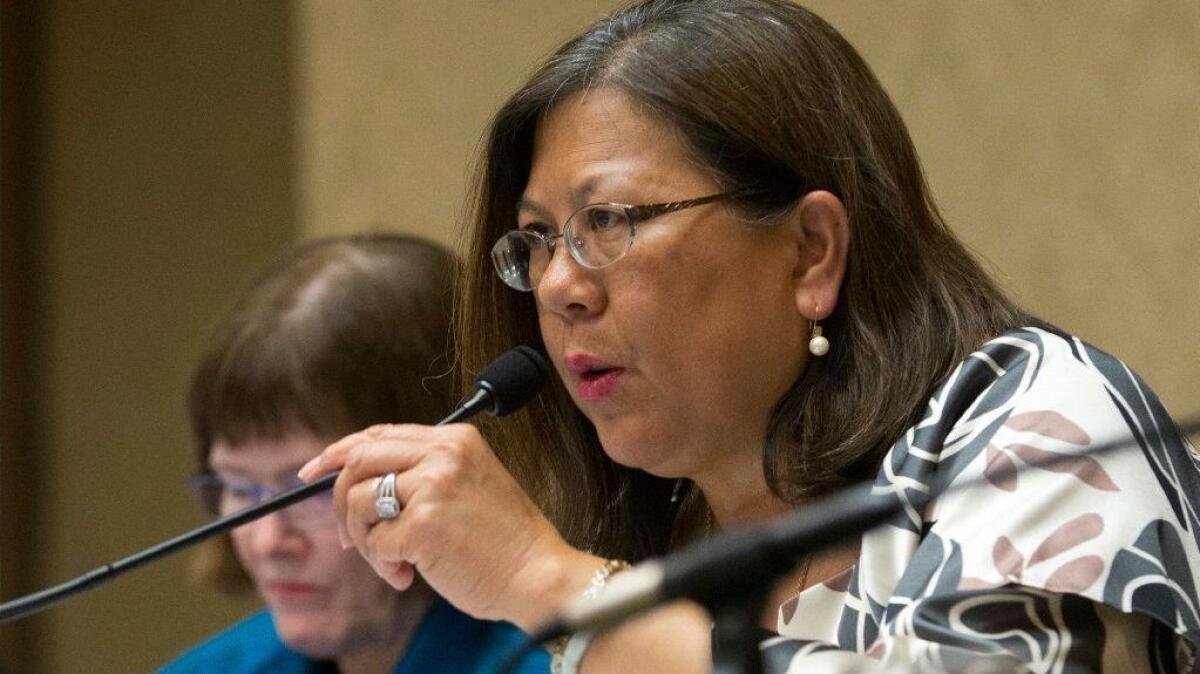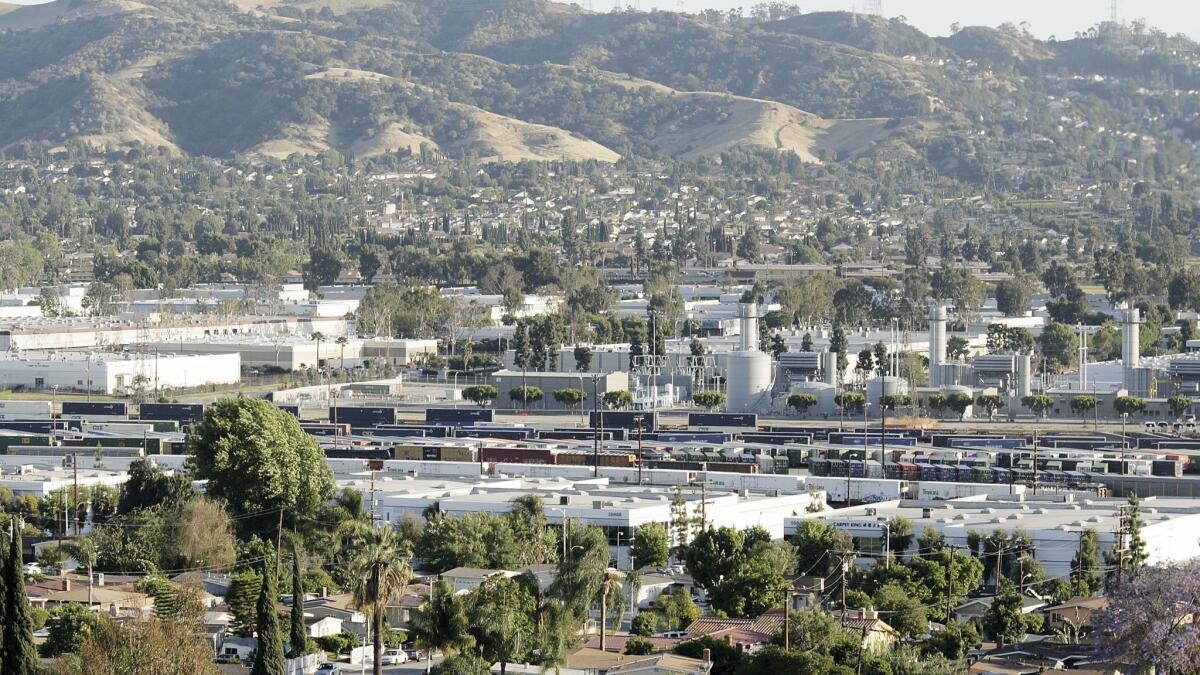State Controller Betty Yee disputes claim that City of Industry audit was ‘politically motivated’

- Share via
Just days before her office announced a rare follow-up audit for the City of Industry in April, state Controller Betty Yee met privately with a Democratic donor embroiled in a dispute with the beleaguered San Gabriel Valley municipality.
Yee said she cut the meeting short with developer Bill Barkett after realizing there was a potential conflict: He was battling the City of Industry over a stalled solar energy project and was discussing a lawsuit seeking to strip city officials of their power. Her office was scrutinizing the city’s finances.
But after the meeting, the State Controller’s Office agreed to review a draft of that lawsuit — one that could benefit not only Barkett, but another well-known figure in the Democratic Party.
Yee’s office then made an unusual move for a public agency: It provided a supporting declaration for the lawsuit on its decision to scrutinize Industry’s finances again, backing up critics’ claims that the city needed new leadership.
“This is really strange to me,” said Jessica Levinson, who teaches governance issues at Loyola Law School and is a former president of the Los Angeles Ethics Commission. “How does the public benefit from this? That’s the question you have to ask. The controller’s office should be doing the people’s work.”
The lawsuit, which lists a group called Concerned Citizens of City of Industry as plaintiffs, was filed later in April by Barkett’s longtime lawyer David Gilmore. It is part of a complicated saga of claims and counterclaims involving the city that erupted again Wednesday with the release of the Controller’s sharply critical follow-up review that found Industry remained plagued by poor oversight nearly three years after an earlier state report came to similar conclusions.
The state report, a draft of which was reviewed last month by The Times, called into question hundreds of thousands of dollars in ATM transactions involving a city venue, dozens of voided checks, nearly $2 million paid to housing contractors “without question or scrutiny” and massively discounted rents at city-owned homes for city leaders and commissioners.
The final version of the state controller’s office report released Wednesday included a response from Industry City Manager Troy Helling alleging that the audit was a “politically motivated attack on the city and its elected and appointed officials” and an attempt to assist “private individuals” who have “personal and political relationships” with the office.
Helling accused state officials of initiating the report to help Barkett, a longtime donor to the Democratic Party and chairman of San Gabriel Valley Water & Power, a company contracted to build a solar energy farm at Tres Hermanos Ranch, a pristine green space populated by longhorn cattle and deer that has been the subject of an ongoing legal dispute over its future. The city had paid $20 million toward the project but pulled the plug after newly elected city officials said San Gabriel Valley Water & Power refused to allow an audit of how the money was spent.
When reached by phone, Barkett referred questions to Darcy Burke, a spokeswoman for San Gabriel Valley Water & Power. Burke said allegations that Barkett — who comes from a politically connected family in Stockton that has donated heavily to Democratic candidates for decades— influenced the follow-up audit are “without merit” and that he has nothing to do with the lawsuit.
“He’s curious about the lawsuit but not part of it,” Burke said.
Yee said she was surprised by Helling’s allegations against her office, which she called ”baseless.”
“Given the seriousness of the findings [in the state’s follow-up review], I feel the city’s response is a diversionary tactic,” she said in an interview with The Times. “They have not been good stewards of public funds.”
Elected to her second term last November as the state’s chief financial officer, Yee said allegations that she was doing Barkett any favors are untrue. Yee, whose campaign finance disclosures show no donations from Barkett, said she does not know him personally and that the meeting was set up by someone from her political campaign, whom she declined to name. She said she met Barkett at a Sacramento coffeehouse on April 2, and when he brought up his dispute with Industry, she ended the meeting.
Had she known about Barkett’s involvement in the lawsuit or his dispute with the city over the stalled solar project, Yee said, she would not have accepted the meeting.
“I’m very serious about not putting myself or my office in a situation where we are conflicted,” she said. “My record shows that.”

Yee said she stood by her office’s decision to review a draft of the lawsuit against the city, adding that the declaration was an objective statement by a staffer recapping audit findings.
Sacramento civil rights attorney Mark Merin is among those who have asked state agencies for declarations supporting arguments in their private lawsuits and says it’s uncommon for such a request to be granted. Yee said her agency provides them on a case-by-case basis.
“You would need the political connection to get access in the first place,” Merin said. “Unless there is a clear governmental interest, you have to know the right person.”
Though Barkett is not listed as a party in the lawsuit, Industry officials allege that emails obtained from the Controller’s Office under the California Public Records Act show he is connected to it. In one email, Gilmore told the controller’s chief counsel that Barkett’s business was the only official member of the concerned citizens’ group that brought the suit, although he added that 20 to 25 people in Industry were interested in joining, but feared retaliation. City officials included the email exchanges in their response to the audit on Wednesday.
The emails also show that the state controller’s office was in frequent touch with Barkett about the lawsuit, which called for former state Atty. Gen. Bill Lockyer, who served as a paid advisor for the city while overseeing reforms called for in the Controller’s 2016 audit, to be reinstated. That position paid Lockyer between $25,000 and $30,000 a month, according to a copy of his contract obtained by The Times.
Lockyer said Thursday that he doesn’t know anything about the lawsuit, but added that he is familiar with Barkett.
“I think everyone in Democratic politics knows Bill Barkett. He’s a donor to everyone, including me,” Lockyer said.
Lockyer, who served as state treasurer from 2007 to 2015 and has opened a campaign committee for a possible run for controller in 2022, said he did not ask for help being reinstated as a consultant to the city. He said he was fired after a dispute with city officials. He said the city needs more oversight, “but I’m not sure it should be me.”
On April 2, the same day as Yee’s meeting with Barkett, the developer traded emails about the lawsuit with Rick Chivaro, chief counsel for Yee’s office and a former law-school classmate of Lockyer.
In one email, Chivaro asked Barkett, “without commenting on the merits of the various causes of action, would like to know what it is you need from this office?”
Barkett responded suggesting a “quick call” before putting him in touch with “the attorney handling the matter to coordinate schedules.”
Consisting mostly of industrial businesses and home to fewer than 300 residents, Industry has long been under a cloud of suspicion for its financial dealings and insular government.
For years, the city government was headed by then-Mayor Dave Perez, who also owned trash-hauling and maintenance companies that racked up millions of dollars a year in contracts with the city, a 2009 Times investigation found.
Of 90 potential voters in the city at the time, about 30 were members of the Perez family or people who lived in properties owned by the family’s investment firm. Many of the remaining voters were city officials or their relatives, or others living in city-owned homes rented at low rates.
An audit years later by KPMG found that Perez’s companies had made a fortune off the city, with contracts valued at more than $326 million. In one example, a Perez company charged six times a competitor’s rate for lawnmower rentals and street-cleaning fees, according to the review. Perez had said his firms’ billings were misrepresented in the review’s findings.
In 2016, a state controller’s office review discovered that the city paid tens of millions of dollars to contractors without tracking how the money was spent or whether the services were even provided. City officials charged lavish meals, wine tastings, massages, an iPad and a 65-inch television to Industry credit cards. Of more than $235,000 in credit card expenses, 83% of that amount was deemed questionable.
The state controller’s new report is a follow-up to that 2016 review and found some improvement. There are stronger policies regulating the use of city credit cards, but the city’s “internal control system” is still “mostly inadequate,” according to the report.
More to Read
Sign up for Essential California
The most important California stories and recommendations in your inbox every morning.
You may occasionally receive promotional content from the Los Angeles Times.















